
One Health
Scope & Guideline
Connecting Health Across Species and Spaces
Introduction
Aims and Scopes
- Interdisciplinary Research on Zoonotic Diseases:
Focus on the transmission and impact of zoonotic diseases, emphasizing research that spans human, animal, and environmental health. - Antimicrobial Resistance Studies:
Investigating the dynamics of antimicrobial resistance across species and environments, with a particular emphasis on the implications for public health and policy. - Environmental Health and Ecosystem Interactions:
Examining the relationships between ecosystem health, biodiversity, and the emergence of infectious diseases, highlighting the importance of environmental factors. - One Health Policy and Implementation:
Exploring the development and effectiveness of policies aimed at integrating One Health approaches into health systems and practices globally. - Surveillance and Risk Assessment:
Conducting comprehensive surveillance studies to identify and mitigate risks associated with zoonotic diseases and antimicrobial resistance.
Trending and Emerging
- Impact of Climate Change on Health:
There is a growing emphasis on how climate change influences the emergence and spread of infectious diseases, highlighting the need for integrated approaches to tackle these challenges. - Antimicrobial Resistance in the Environment:
Recent publications increasingly focus on the environmental aspects of antimicrobial resistance, exploring how resistance genes disseminate through ecosystems and affect both human and animal health. - Community-Based One Health Initiatives:
Emerging research is emphasizing community engagement in One Health initiatives, recognizing the importance of local knowledge and practices in managing health risks. - Intersectoral Collaboration for Health Security:
A trend towards examining collaborative frameworks that integrate human, animal, and environmental health sectors to enhance health security and response to outbreaks. - Artificial Intelligence and Data Analytics in One Health:
The application of AI and data analytics to predict and manage health risks is on the rise, showcasing innovative methodologies that enhance surveillance and intervention strategies.
Declining or Waning
- Traditional Veterinary Practices:
There is a noticeable decline in papers focusing solely on traditional veterinary practices without integrating broader One Health perspectives, as the field evolves towards more interdisciplinary approaches. - Non-Zoonotic Infectious Diseases:
Research specifically dedicated to non-zoonotic infectious diseases has become less prominent, as the emphasis has shifted towards zoonoses and their interconnections with human and environmental health. - Single-Domain Approaches:
Studies that focus exclusively on human health or animal health in isolation are becoming less common, as researchers increasingly recognize the importance of a One Health framework.
Similar Journals

Current Research in Parasitology & Vector-Borne Diseases
Fostering interdisciplinary dialogue in parasitology research.Current Research in Parasitology & Vector-Borne Diseases, published by ELSEVIER, is an influential journal dedicated to advancing the understanding of parasitology and vector-borne diseases. With an ISSN of 2667-114X, this journal is highly esteemed in the field, holding a prestigious Q1 quartile ranking in categories such as Animal Science and Zoology, Insect Science, and Parasitology, as well as a notable Q2 ranking in Virology for 2023. The journal's focus spans a crucial intersection of disciplines, offering a platform for innovative research that directly addresses global health challenges posed by parasites and vectors. Researchers benefit from its robust open-access model, which facilitates unrestricted dissemination of knowledge, making essential findings accessible to a wider audience. The journal continues to play a pivotal role in fostering scholarly dialogue and interdisciplinary collaboration within the scientific community, serving as a vital resource for professionals, students, and academicians interested in the dynamic and evolving field of parasitology.

EcoHealth
Innovating Solutions for Ecological and Human Well-beingEcoHealth, published by Springer, is a premier academic journal at the intersection of ecology and health, dedicated to advancing our understanding of the interconnections between environmental conditions and human health. Established in 2004, the journal aims to contribute to the rapidly evolving field by publishing innovative research that addresses the complexities of socio-ecological systems. With an impressive impact factor reflecting its standing in the Q2 category for both Ecology and Health, Toxicology, and Mutagenesis, EcoHealth is highly regarded among researchers and practitioners alike. The journal’s inclusion in top-tier Scopus rankings—125th out of 461 in Environmental Science _ Ecology and 77th out of 148 in Environmental Science _ Health, Toxicology and Mutagenesis—further underscores its significance in the scientific community. EcoHealth is committed to facilitating open discussions and interdisciplinary collaboration, making it an essential resource for students, researchers, and professionals seeking to explore the critical linkages between ecological integrity and public health.
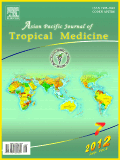
Asian Pacific Journal of Tropical Medicine
Empowering knowledge for a healthier tropical future.Asian Pacific Journal of Tropical Medicine, published by Wolters Kluwer Medknow Publications, stands at the forefront of research in the field of tropical medicine, contributing significantly to the global understanding of health issues prevalent in the Asian Pacific region. With an ISSN of 1995-7645 and an E-ISSN of 2352-4146, this esteemed journal has been an Open Access platform since 2011, ensuring that vital research is accessible to a broad audience. The journal boasts a commendable Scopus rank of 131 out of 636 in the General Medicine category, placing it in the 79th percentile and recognizing its influential contributions to the discipline. Based in Mumbai, India, the journal spans converged years from 2010 to 2024 and is categorized in the Q3 quartile for miscellaneous medicine as of 2023. Researchers, professionals, and students can leverage this journal to stay abreast of the latest findings and developments in tropical medicine, making it an indispensable resource in their academic and professional pursuits.
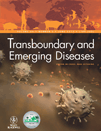
Transboundary and Emerging Diseases
Fostering collaboration in the fight against transboundary diseases.Welcome to Transboundary and Emerging Diseases, a prestigious journal published by WILEY-HINDAWI. With its ISSN of 1865-1674 and E-ISSN of 1865-1682, this journal plays a pivotal role in the dissemination of high-quality research within the fields of Immunology, Microbiology, Medicine, and Veterinary Sciences. Based in the United Kingdom, this open-access journal stands out with a remarkable impact factor, reflecting its category quartiles in 2023, where it secured Q1 rankings across multiple disciplines, including a remarkable rank of #3 out of 194 in Veterinary General, placing it in the top 2% of its field. With coverage spanning from 2008 to 2024, Transboundary and Emerging Diseases provides a vital platform for researchers, professionals, and students to explore emerging threats to global health and animal welfare. The journal's commitment to open access ensures broad availability of cutting-edge research, fostering collaboration and knowledge sharing in pursuit of innovative solutions to transboundary diseases. Join a community dedicated to advancing the science and practice within this crucial area of study.
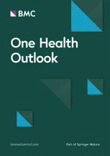
One Health Outlook
Innovating research for a sustainable future.One Health Outlook is a dynamic open-access journal published by BMC, dedicated to advancing research and discourse within the interdisciplinary field of One Health. With a critical focus on the interconnectedness of human, animal, and environmental health, this journal provides a platform for scholarly discussions that address global health challenges. Launched in 2019 as an open-access resource, One Health Outlook aims to foster collaboration among researchers, practitioners, and policymakers, enabling them to share innovative solutions and data that influence health outcomes worldwide. Its commitment to making research freely accessible enhances its potential impact and reach, making it an invaluable resource for anyone engaged in One Health studies. The journal strives to bridge gaps in knowledge and promote best practices through high-quality research articles, review papers, and case studies, ensuring relevance in an ever-evolving health landscape.
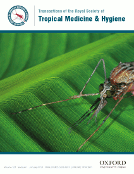
TRANSACTIONS OF THE ROYAL SOCIETY OF TROPICAL MEDICINE AND HYGIENE
Connecting Knowledge to Combat Infectious DiseasesTransactions of the Royal Society of Tropical Medicine and Hygiene is an esteemed academic journal published by Oxford University Press, that has been a cornerstone in the field of tropical medicine since its inception in 1907. With an ISSN of 0035-9203 and an E-ISSN of 1878-3503, this journal endeavors to advance knowledge in the disciplines of Infectious Diseases, Parasitology, and Public Health, among others. Ranked Q2 in four key categories according to 2023 journal metrics, it holds a reputable position in its field, as evidenced by its Scopus rankings, notably achieving a 62nd percentile in Public Health and a 60th percentile in Parasitology. The journal is crucial for researchers and healthcare professionals aiming to address pressing global health issues that impact tropical regions. Though it does not offer open access, its rigorous peer-review process ensures that only the highest quality research articles are published, fostering an essential scholarly dialogue that contributes to the improvement of health standards worldwide. We invite you to explore and contribute to this influential platform that shapes the future of tropical medicine and hygiene.

IJID Regions
Bridging research and policy for enhanced health outcomes.IJID Regions is a pioneering open access journal published by Elsevier, focusing on the critical fields of epidemiology, infectious diseases, and public health. Established in 2021, the journal aims to provide a platform for disseminating high-quality, innovative research that addresses pressing health issues and informs evidence-based practices in communities around the globe. With its impact factors reflecting a Tier Q2 and Q3 ranking in various medical subcategories on the Scopus platform, IJID Regions is positioned as a valuable resource for researchers, health professionals, and policy-makers striving to enhance public health outcomes. This journal not only champions open access since its inception, promoting the free flow of information, but also welcomes contributions that shed light on contemporary challenges in environmental and occupational health. Its commitment to fostering dialogue and collaboration in the health sciences is paramount, making it an essential read for those engaged in advancing public health knowledge and initiatives.
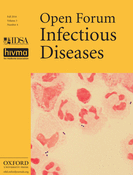
Open Forum Infectious Diseases
Shaping the future of infectious disease scholarship.Open Forum Infectious Diseases (ISSN: 2328-8957; E-ISSN: 2328-8957) is a leading open-access journal published by Oxford University Press, dedicated to advancing the field of infectious diseases. Since its inception in 2014, the journal has provided a platform for researchers to disseminate impactful findings in a rapidly evolving domain, achieving a remarkable Q1 ranking in both the Infectious Diseases and Oncology categories as of 2023. The journal encourages rigorous and innovative research, contributing significantly to global health discussions and informing best practices in clinical settings. As an open-access journal, it ensures that its content is accessible to a wide audience, fostering collaboration and knowledge sharing among researchers, professionals, and students alike. Positioned in the heart of the United States, Open Forum Infectious Diseases serves as a critical resource for the academic community, and its continued commitment to quality and relevance secures its status as an essential publication in the field.
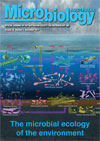
Microbiology Australia
Empowering Global Discourse in MicrobiologyMicrobiology Australia is a prominent journal published by CSIRO PUBLISHING, focusing on the diverse and rapidly evolving field of microbiology. Since its transition to Open Access in 2021, it has broadened its accessibility, fostering greater dissemination of research findings among scholars and practitioners. The journal features a range of topics that are pivotal for understanding microbial systems in applied microbiology, medical microbiology, public health, and environmental applications. Despite its current categorization in the Q4 quartile across several categories, it remains an essential platform for emerging research and innovative methodologies. Researchers and professionals can benefit from the journal's commitment to enriching the global discourse on microbiological advancements. With its ISSN 1324-4272 and E-ISSN 2201-9189, Microbiology Australia caters to a wide audience in Australia and beyond, making significant strides in bridging the gap between research and practical applications in microbiology.
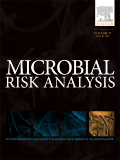
Microbial Risk Analysis
Advancing Understanding of Microbial ThreatsMicrobial Risk Analysis, published by Elsevier, is a pivotal academic journal specializing in the intersection of epidemiology, infectious diseases, and medical microbiology. With an ISSN of 2352-3522 and an E-ISSN of 2352-3530, this journal has been contributing to the field since its inception in 2016 and continues to invite groundbreaking research as it converges through 2024. With a respectable impact factor, Microbial Risk Analysis holds a Q3 designation in key categories, showcasing its credibility with ranks such as #48 in Epidemiology and #124 in Infectious Diseases according to Scopus. The journal serves as an essential platform for researchers, professionals, and students alike, aiming to enhance understanding of microbial risks and their public health implications. Although it operates under a subscription model, its contents remain accessible to a broad range of interdisciplinary scholars dedicated to advancing microbial research. For those at the forefront of epidemiological and infectious disease studies, Microbial Risk Analysis represents a crucial resource for disseminating knowledge and fostering collaboration.